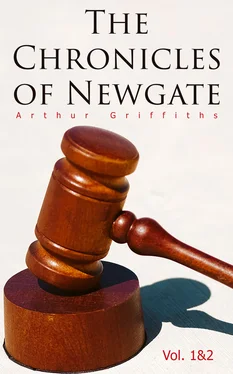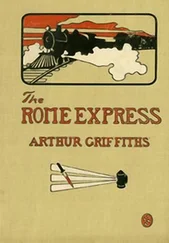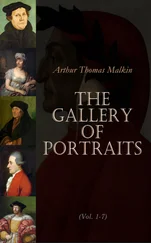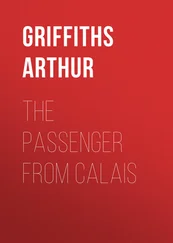Long before this, however, Edward I. had dealt very sharply with evil-doers. By the suspension of corporation government following that king’s conflict with the city authority, “all kinds of licentiousness had got leave to go forward without control.” At length the frequency of robberies and murders produced the great penal statute of the 13 Edward I. (1287). By this Act it was decreed that no stranger should wear any weapon, or be seen in the streets after the ringing of the couvre-feu bell at St. Martin’s-le-Grand; that no vintners and victuallers should keep open house after the ringing of the said bell under heavy fines and penalties; that “whereas it was customary for profligates to learn the art of fencing, who were thereby emboldened to commit the most unheard-of villanies, no such school should be kept in the city for the future upon the penalty of forty marks for every offence.” Most of the aforesaid villanies were said to be committed by foreigners who from all parts incessantly crowded to London; it was therefore ordered that no person not free of the city should be suffered to reside therein; and even many of those that were were obliged to give security for their good behaviour.[8]
The ‘Liber Albus,’ as translated by Riley, gives the penalties for brawling and breaking the peace about this date. It was ordained that any person who should draw a sword, misericorde (a dagger with a thin blade used for mercifully despatching a wounded enemy), or knife, or any arm, even though he did not strike, should pay a fine to the city of half a mark, or be imprisoned in Newgate for fifteen days. If he drew blood the fine was twenty shillings, or forty days in Newgate; in striking with the fist two shillings, or eight days’ imprisonment, and if blood was drawn forty pence, or twelve days. Moreover, the offenders were to find good sureties before release, and those on whom the offence was committed had still “recovery by process of law.”
Nor were these empty threats. The laws and ordinances against prowlers and vagabonds, or “night-walkers,” as they were officially styled, were continually enforced by the attachment of offenders. Many cases are given in the memorials of London. Thus, 4 Edw. II. A.D. 1311: Elmer de Multone was attached on indictment as a common night-walker in the ward of Chepe; “in the day,” it was charged, “he was wont to entice persons and strangers unknown to a tavern and there deceive them by using false dice.” He was furthermore indicted “in Tower ward for being a cruiser and night-walker against the peace, as also for being a common ‘rorere.’[9] Multone was committed to prison. Others met with similar treatment. John de Rokeslee was attached as being held suspected of evil and of beating men coming into the city;” “Peter le Taverner, called Holer,” the same, and for going with sword and buckler and other arms; John Blome was indicted “as a common vagabond[10] for committing batteries and other mischiefs in the ward of Aldresgate and divers other wards.” “A chaplain,” our modern curate, Richard Heryng, was attached on similar charges, but was acquitted. Not only were the “roarers” themselves indicted when taken in this act, but also those who harboured them, like John Baronu mentioned in the same document as attached “for keeping open house at night, and receiving night-walkers and players at dice.” The prohibition against fencing-masters was also rigorously enforced, as appears by the indictment of “Master Roger le Skirmisour, for keeping a fencing school for divers men, and for enticing thither the sons of respectable persons so as to waste and spend the property of their fathers and mothers upon bad practices, the result being that they themselves become bad men. Master Roger, upon proof of a jury that he was guilty of the trespasses aforesaid, was committed to Newgate.”
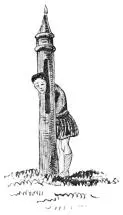
Incarceration in Newgate, however, was meted out promptly for other offences than those against which the last-mentioned legislation was directed. Priests guilty of loose living, Jews accused rightly or wrongly, now of infanticide, of crucifying children, now of coining and clipping, found themselves in the gaol for indefinite periods. People, again, who adulterated or sold bad food were incontinently clapped into gaol. Thus William Cokke of Hesse (or Hayes) was charged with carrying a sample of wheat in his hand in the market within Newgate, and following one William, the servant of Robert de la Launde Goldmsith, about from sack to sack, as the latter was seeking to buy wheat, telling him that such wheat as the sample could not be got for less than twenty-one pence per bushel, whereas on the same day and at the same hour the same servant could have bought the same wheat for eighteen pence. Cokke, when questioned before the Mayor, Recorder, and certain aldermen, acknowledged that he had done this to enhance the price of wheat to the prejudice of all the people. He was in consequence committed to gaol, and sentenced also to have the punishment of the pillory. The same fate overtook Alan de Lyndeseye and Thomas de Patemere, bakers, who were brought before the bench at Guildhall, and with them “bread they had made of false, putrid, and rotten materials, through which persons who bought such bread were deceived and might be killed.” The fear of imprisonment, again, was before the eyes of all who sought to interfere with the freedom of the markets. Thus it is recorded in the ordinances of the cheesemongers, that “whereas the hokesters (hucksters) and other who sell such wares by retail do come and regrate such cheese and butter before prime rung, and before that the commonalty had been served, may it be ordained that no such hokesters shall buy of any foreigner before the hour of prime on pain of imprisonment at the will of the Mayor.” Similar penalties were decreed against “regrating” fish and other comestibles for the London markets.
In 1316 Gilbert Peny was bound in the third time in default for selling bread deficient in weight. He had been twice drawn on the hurdle, and it was therefore now adjudged that he should be drawn once more, and should then forswear the trade of a baker in the city for ever. One of many similar cases is that of William Spalyng, who, for selling putrid beef at “les Stokkes,” the stocks market near Walbrook, was put upon the pillory, and the carcases were burnt beneath. Another who made shoes of unlawful material had them forfeited. Bakers who stole dough from the moulding-boards of other bakers were exposed on the pillory with the dough hung about their necks[11].
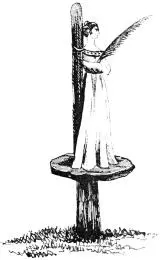
Richard le Forester, for attempting to defraud with a false garland or metal chaplet for the head, was sentenced to stand in the pillory, and afterwards to forswear the city for a year and a day. Traders convicted of having blankets vamped in foreign parts with the hair of oxen and of cows were punished, and the blankets were burnt under the pillory on Cornhill. Similarly, false gloves, braces, and pouches were burnt in the High Street of Chepe near the stone cross there. John Penrose, a taverner, convicted of selling unsound wine, was adjudged to drink a draught of the said wine, and the remainder was then poured out on his head. Alice, wife of Robert de Cranstom, was put in the thew, or pillory for women, for selling ale by short measure; and so was Margery Hore for selling putrid soles, the fish being burnt, and the cause of her punishment proclaimed. Two servants of John Naylere were placed in the stocks upon Cornhill for one hour, and their sacks burnt beside them, for selling a deficient measure of charcoal, while their master’s three horses were seized and detained by the Mayor’s sergeant until he (Naylere) came and answered for the aforesaid falsity and deceit. William Avecroft, having unsound wine, the sheriffs were ordered to pour all the wine in the street and wholly make away with it, according to the custom of the city.
Читать дальше
